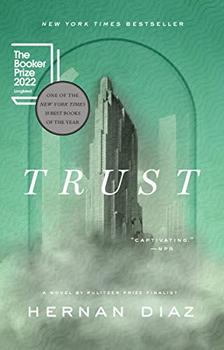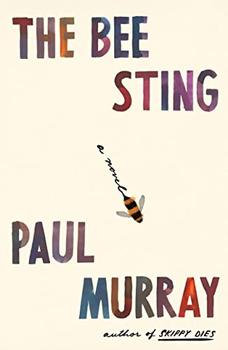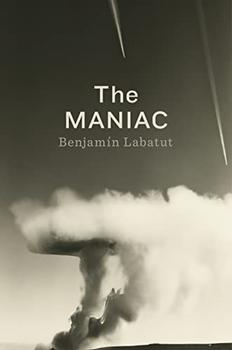Summary | Excerpt | Reading Guide | Reviews | Beyond the book | Read-Alikes | Genres & Themes | Author Bio

Critics' Opinion:
Readers' Opinion:
First Published:
May 2022, 416 pages
Paperback:
May 2023, 416 pages
 Book Reviewed by:
Book Reviewed by:
Chloe Pfeiffer
Buy This Book
Hernan Diaz's Trust is a work of fiction that is itself comprised of four very different works existing in the world of its story. Bonds is a novel published in the 1930s about Benjamin Rask, who increased his fortune playing the 1920s stock market before his wife Helen's madness and death. Next is an unfinished autobiography by Andrew Bevel, on whom Benjamin Rask was unashamedly based—he wants to correct the story about him and his late wife, Mildred. This is the least interesting section, but it also has the highest number of funny lines in the book, and surprisingly tender moments of vulnerability. Bevel comes across as an almost cartoonish villain; of the increase in women trading stocks leading up to the market crash, for example, he writes, "Could there have been a clearer indicator of the disaster to come?" In moments like these, it seems that Diaz has created not an authentic character but a gun-range silhouette for the modern, feminist reader to aim her weapon at. But Bevel is also battling, we can tell, his own demons, like a nebulous inferiority complex and, worse, subpar writing skills. At other times, he sort of endearingly trips over himself in excitement when talking about the stock market. The result is at times dull and at times more entertaining and affecting than Bonds (which isn't sensationalized, exactly, but creeps towards that territory by the end).
The third section is a memoir by Bevel's secretary, Ida Partenza, a Brooklynite whose father is a bombastic, anarchic Italian immigrant. She was hired shortly after Bonds was published, and her memoir looks back at her brief employment from 50 years in the future, in the late 1980s. This section, like the others, subverts and sheds new light on what came before it; reading Trust becomes not just an act of following a narrative but sifting through overlapping ones. The last section is Mildred's, and the best.
The thematic premise of Trust is immediately signaled by its double entendre title and table of fake contents: the lies of fiction (wink wink), the elisions of history. The novel is like a feminist retelling of a classic, male-oriented story, except that the original story is also one that Diaz wrote. Look at what is missing from these accounts, he implores us. Who do you believe?
Luckily for the reader, the "right" answer isn't obvious as you're reading. Over the course of the four parts, Diaz expertly fosters a sense of mystery and tension about what really transpired, and, more importantly, what people's characters and relationships really were. Trust is conventional in that our most pressing questions of plot are answered at the end, but there is no climactic eureka moment, where some crime is solved and the criminal is dramatically exposed—although there is one reveal, late in the book, that provides that satisfying feeling of shock and recognition: "Of course, how could I have not seen it coming?!" Diaz seems to want to impress upon the reader the power of money and the mysterious forces of its accumulation, but the Bevels' obscene wealth is too abstracted, and the machinations of its growth too banal, to really care about it. Whether Bevel's capitalist moves are legal, whether they are a product of dumb luck, whether they are magic or genuine genius, is almost irrelevant to Trust's deeper mysteries and hidden truths.
Trust can be frustrating, sometimes, in its heavy-handedness, and its (perhaps ironic) inability to trust its reader. Diaz explains obvious connections and parallels between sections. And, at times, Ida's character is used as a mouthpiece through which Diaz signals to the modern reader that he doesn't condone his characters, that he understands their flaws. In one part of her memoir, Ida points out for us that Bevel didn't mention slavery once in the family history part of his autobiography, despite his family's business with sugar and cotton plantations. Yes, this is glaring and obvious; only a reader who was half asleep could read pages about plantations and the Civil War and fail to register the omission of slavery, and then fail to incorporate that omission into their interpretation of Bevel's character. And yet Diaz has Ida spell it out for us, and assure us how wrong it was, under the pretense of describing her own moral journey. Ida is a compelling narrator, but at moments like these, she becomes more of a prop than her own character.
Any stylistic shortcomings of Trust fall away in the final section, which is in Mildred's voice. Mildred is somewhat of a black hole throughout the novel (What was she really like? Ida often wonders) so I won't say too much. Only that her diaries resemble, in part, a fragmented contemporary novel, with tons of white space and a magpie-like collection of lines and sentences. But while contemporary novels too often juxtapose disparate thoughts and ask the reader to connect them, Mildred insists on attempting to make her own meaning. In this "work," Diaz finally strikes the perfect balance of explication, connection and mystery.
![]() This review was originally published in The BookBrowse Review in May 2022, and has been updated for the
June 2023 edition.
Click here to go to this issue.
This review was originally published in The BookBrowse Review in May 2022, and has been updated for the
June 2023 edition.
Click here to go to this issue.

If you liked Trust, try these:

by Paul Murray
Published 2024
From the author of Skippy Dies comes Paul Murray's The Bee Sting, an irresistibly funny, wise, and thought-provoking tour de force about family, fortune, and the struggle to be a good person when the world is falling apart.

by Benjamin Labatut
Published 2023
From one of contemporary literature's most exciting new voices, a haunting story centered on the Hungarian polymath John von Neumann, tracing the impact of his singular legacy on the dreams and nightmares of the twentieth century and the nascent age of AI





The Funeral Cryer by Wenyan Lu
Debut novelist Wenyan Lu brings us this witty yet profound story about one woman's midlife reawakening in contemporary rural China.
Your guide toexceptional books
BookBrowse seeks out and recommends the best in contemporary fiction and nonfiction—books that not only engage and entertain but also deepen our understanding of ourselves and the world around us.